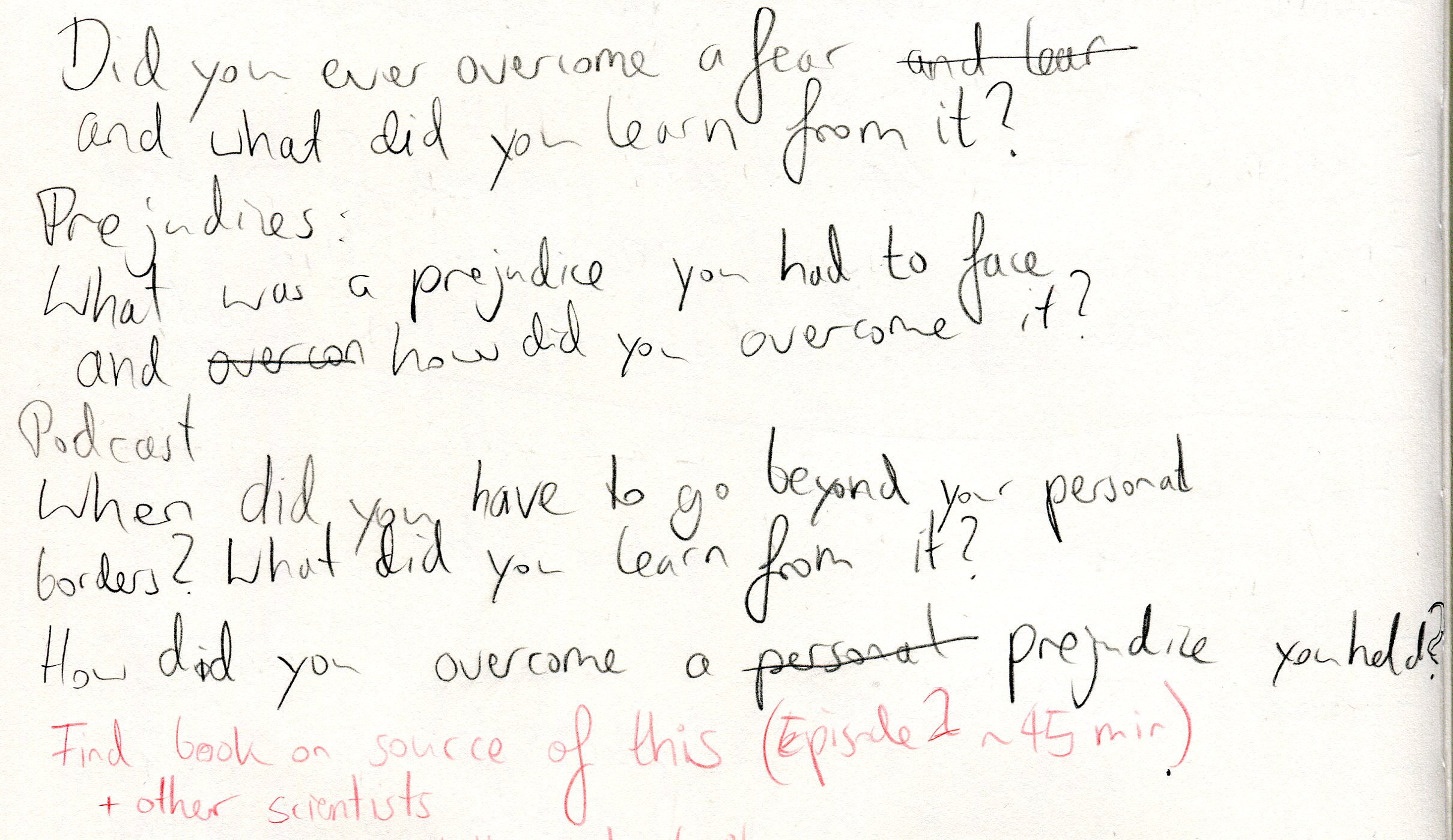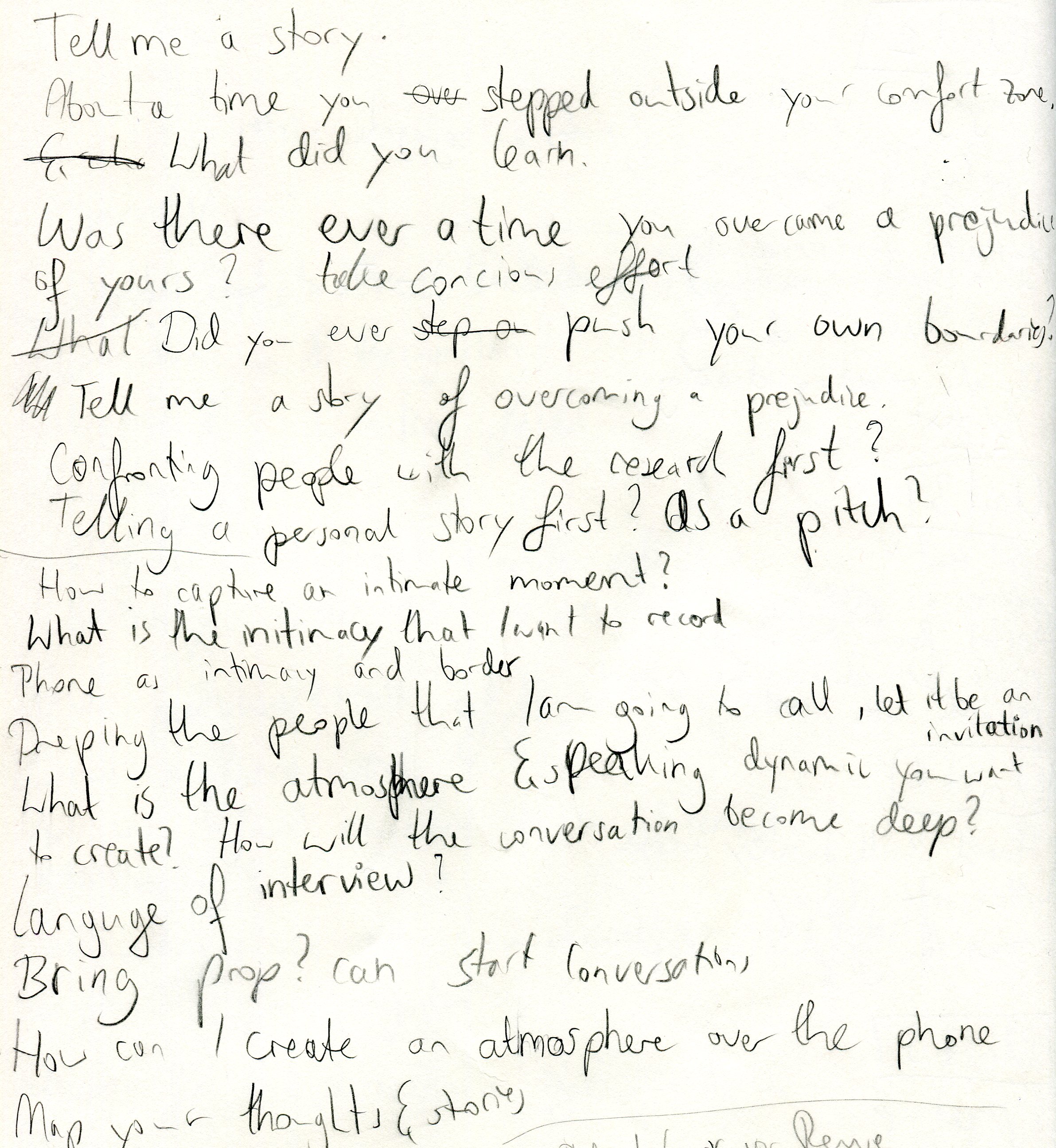UNIT 5
←
return to homepage
NOTES MEETING
INDIVIDUAL PROJECT
FRANZISKA
Intimacy
Street slang - way of covering vulnerability
Short film with sounds
People telling a story
Interviewing people
Archiving something
franziska: Interviewing grandma, not rest of family
Who do we want to ask? What do we want to know? Whose story do I want to know?
Catching the intimacy.
Capturing the way of speaking: such a personal thing.
Think of a topic to talk to people about.
Think of a question to ask people.
What are the most important borders that you’ve crossed?
Violence of displacement
Intimacy of Body language
Its about a story, an intimacy
Possible questions:
When was the last time you touched someone and felt something?
When was the last time you felt touched?
What is the last deep conversation you’ve had?
Access to stories - border & barrier of everyday conversation
The last silent movie
Unknowable - the ones that cannot speak and the ones that cant be heard
Collecting recordings
Resist colonies by bringing people together with music
Create languages & communication in the presence
Behavioral way of approaching language
Linda rocco


Notes podcast Ocean Vuong
https://onbeing.org/
programs/ocean-vuong-a-
life-worthy-of-our-breath/
11:30
My roots in the narrative and literary techniques and embodiment started way before I entered the. classroom. Stories are carried in the bodies and its edited each time the person tells it. What you have by the time someone tells a story is a masterclass.
The body is the ultimate witness of love
The future is in your mouth. You have to articulate the world that you want to live in first.
What if literature, what if the poem the story the novel at its best, can serve as a fire escape?
Own project:
3 elements
- a story by my dad
- a story by my grandma
- a story by me
- about my heritage being the stories of my dad and grandma
- the death of my homeland
“Itha akolek i7chili kosat hayatek shino tgooli?”
“itha akolak i7chili 3an watanek, shinoo tkoli”
ask my parents this.
ask myself this: I will answer my homeland lies in the stories of my parents.
Maybe connect Teba Sadiq? Interview her from Zoom? Or just have a conversation with her. To contrast my experience with hers, to explore the similarities and differences in our experience of Iraq. Or our experience of our parents stories
Should I do separate smaller videos?
Do I want to film them on a certain set? What should the set of the film be? Do I want a predecorated staged set? Or do I want them in their natural environment? Or in between?
Bibi interview in her home. Then also film her as she for instance makes my tea.
I want to create the scene, the environment and experience of having a story told by your grandma
PODCAST NOTES YUSSER
Prepare an invitation
Preparation:
- we have to have the right atmosphere, right moment
- Informal instead of interrogation interview
- think of the difference between being an interviewer and having a conversation together
- Use objects to guide you
- You can do something together
- Interview: purpose
Prepare:
- How do I find those stories
- How can I help him to find them
- Photoalbum?
- Show them book of photographs
- What do I ask? How do we create intimacy? What is his sense of intimacy? Is there a border for intimacy that shouldn’t be crossed
- Then guide this with questions
- How do I experience when there is intimacy and when there isn’t
- Intimacy is fragile.
- How did we first experience intimacy?
- How do we lose this?
- How to create intimacy when there is no intimacy?
ROSA'S TIPS
INDIVIDUAL PROJECT
CLARA
Notes:
Feeling that occurs in times of COVID 19:
- ideas of boarders are coming closer and closer also due to corona
- first time experiencing a boarder from a country
Violence towards Nature:
Othering nature - how much are we involved with nature? Aren’t we then othering nature every time when we talk about it? It being some object rather than a subject.
Can we even say othering when it comes to nature and when it is not about humans?
Also sharing with nature. Seeing it also may be metaphorical. How can we give nature something that it also gives us something?
Meeting the people beforehand, build a relationship
How long to have contact with nature? When is our relationship built up? How is it when it is not a human?
share first with nature and then maybe nature wants to share with you. Give something from you, not improving nature, but really open your heart.
Meditation, how to connect with nature?
How will we record nature? (cutting down of trees?, something that is not visible) What is the pain of nature?
Can I connect the two?
My path from stress at home, to relive in nature. Where is the border?
Recording Nature, Interviewing Nature. How is it not having a person as your interviw partner?
Notes Feedback moment:
thinking back of intimacy towards nature (where is speech integrated in this?)
overcoming border of stress
architectural lense
panopticum (being watched)
seeing the forest change
cultural prop ( diary watching one plant)
different time, in the forest
we can follow leaders that we never meet
wolves can coordinate really complext orders
we are between ants and wolves
restrictions are logical orders, we dont know what will happen, like borders we cant see, orders that we dont know what we can do with,
stay with it!
working with my own feeling
interviewing myself
how we are experiencing it
maping out my walk through the architecture
things are quite packed in
always eyes in private space
what changes for me
what is the thing that releases for me
how can you interview a non human
the secret life of trees
how forests think, border to nature
wild woods are borderless spaces
borders of the bos, in the netherlands
the limit of what that space is (space, George Perec)
INDIVIDUAL PROJECT
YUSSER
Border subjectivities rooted in a tolerance for ambiguity out of the necessity remind us of an important element of what a border epistemology — as a way of thinking — for IR and GP could entail: border thinking as a physical sensual experience of a self-in-between that is a plural self (ibid.: 35). This means an emphasis on a knowing that sits in bodies and territories and its local histories in contrast to disembodied, abstract, universalist knowledge that generates global designs (Mignolo 2009; 2010). Recognizing that knowledge is situated implies “[seeing] the world from specific locations, embodied and particular, and never innocent” (Rose 1997: 308).
GLORIA ANZALDUA - BORDERLANDS
UNIT 6